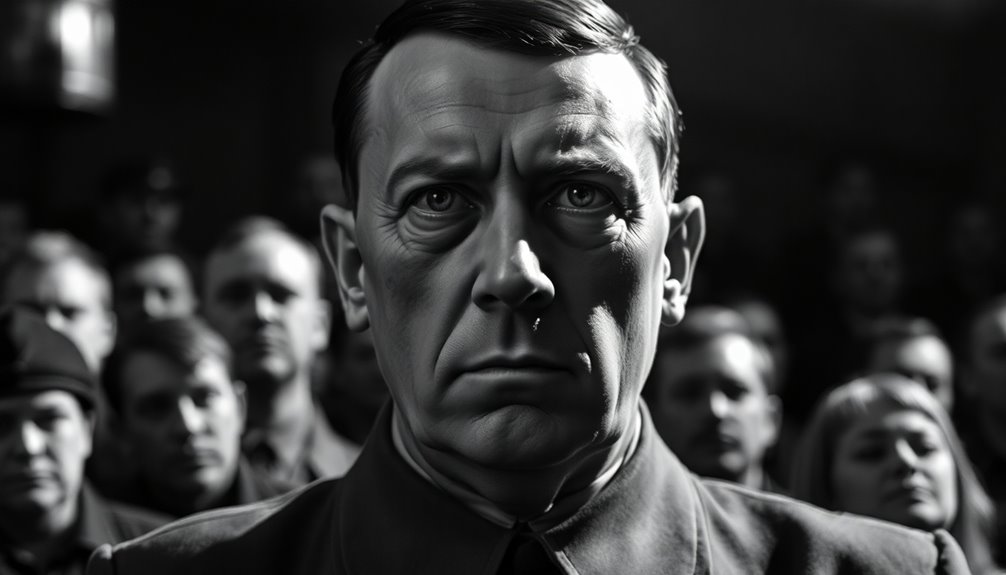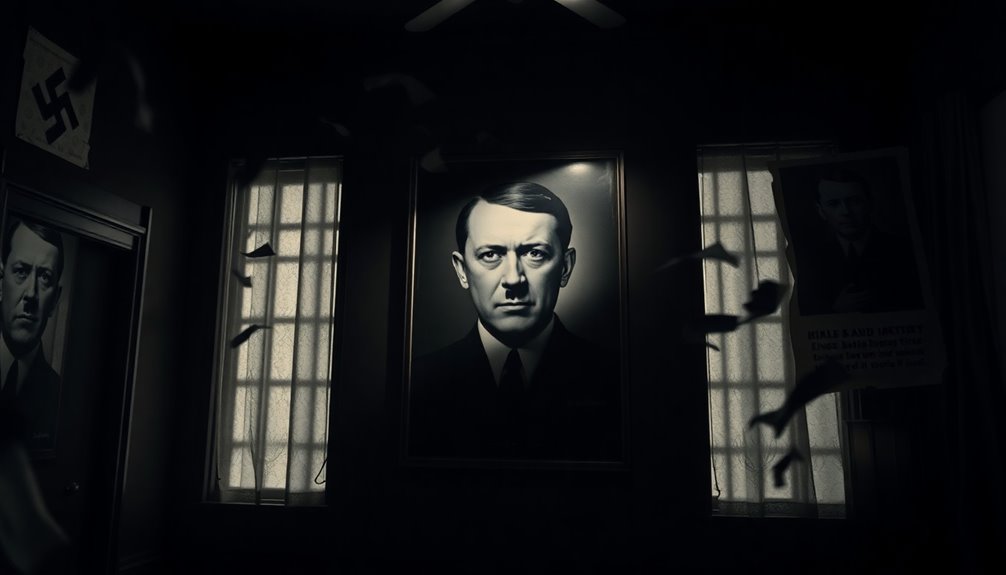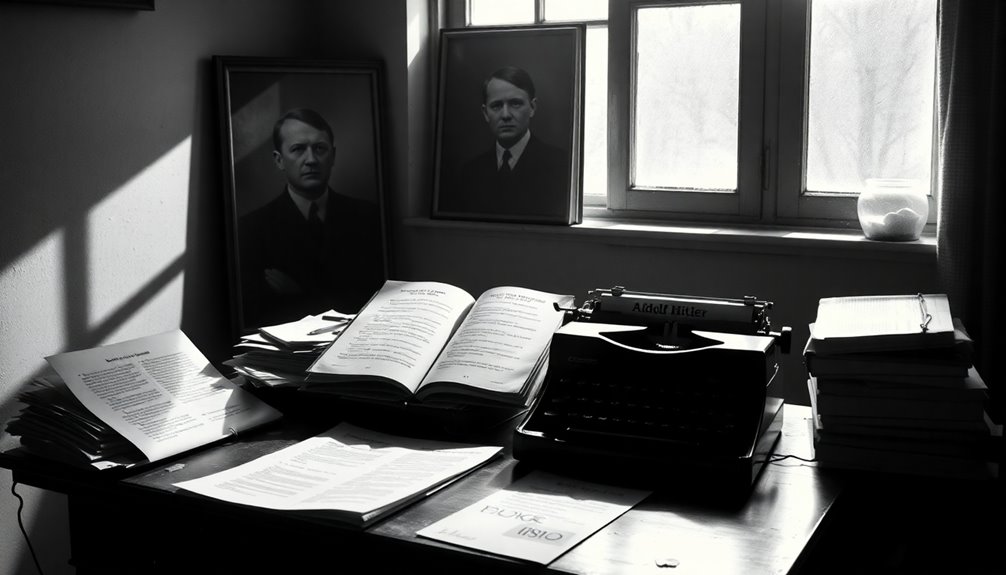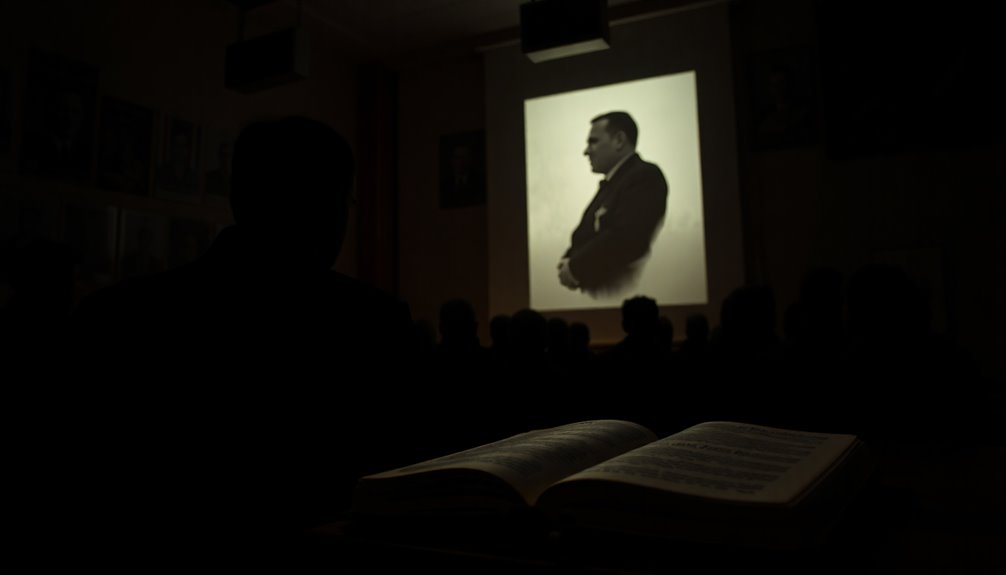Adolf Hitler’s quotes provide unsettling insights into the dark ideology that fueled his regime. They reveal how he manipulated fear to control public opinion and scapegoat enemies, particularly Jews and communists. His propaganda aimed to rally support by promoting nationalism and rejecting democratic ideals for a vision of racial purity. These quotes also illustrate the normalization of violence and oppression, showing the lengths he’d go to consolidate power. Understanding the complexities behind these words is vital, as they reflect mechanisms of hate still relevant today. Explore further to uncover more about how these ideas resonate in contemporary contexts.
Key Takeaways
- Hitler’s quotes reveal the manipulation of fear to justify violence and oppression against perceived enemies, particularly Jews and communists.
- His propaganda emphasized racial purity and exclusion, promoting a centralized authority that rejected democratic values in favor of authoritarian control.
- The concept of “Volksgemeinschaft” showcased his vision of unifying the Aryan population by alienating and exterminating undesirables.
- Paranoia towards Jewish influence was prevalent in his rhetoric, depicting Jews as significant societal threats that needed to be eliminated.
- The enduring relevance of Hitler’s quotes serves as a warning against modern-day misinformation and exclusionary ideologies that echo his extremist views.
Introduction

When exploring Adolf Hitler’s quotes, it’s crucial to understand the context in which they were delivered. His quotes reveal a disturbing ideology rooted in nationalism and anti-Semitism, which he manipulated to rally support during Germany’s turmoil.
You’ll notice how he employed propaganda to vilify perceived enemies, portraying them as threats to a racially pure society. This rhetoric wasn’t just about expressing beliefs; it was a strategic tool that stirred fear and anger among the populace.
The Essence of Fear in Quotes

To grasp the essence of fear in Hitler’s quotes, you must recognize how he wielded it as a weapon to control and mobilize the masses. He often used fear to manipulate public opinion, insisting that a strong leader must evoke it to maintain power.
His rhetoric skillfully painted external enemies, like Jews and communists, as scapegoats, channeling the populace’s anger and frustration away from the government’s failures. By creating a sense of urgency, he justified extreme measures and consolidated his control.
This tactic didn’t just distract from economic woes; it normalized violence and oppression, ultimately leading to widespread complicity in the atrocities committed during his regime. Fear became a cornerstone of his ideology, driving the actions of his followers.
Quotes Reflecting Authoritarian Ideals

Hitler’s manipulation of fear seamlessly ties into his promotion of authoritarian ideals. He believed that a strong, centralized authority was essential for restoring Germany’s national pride post-WWI.
Through propaganda, he convinced you that emotional appeals could sway the masses, justifying his authoritarian control. His vision of a “Volksgemeinschaft,” or people’s community, aimed to unify the Aryan population while excluding those he deemed undesirable.
His quotes often rejected democratic principles, advocating for the extermination of political opposition and prioritizing racial purity. Fear and intimidation were central to his leadership style; he thought instilling dread would guarantee your compliance and loyalty to the Nazi regime.
In this way, Hitler’s rhetoric reveals a chilling commitment to authoritarianism.
On Nationalism and Racism
Nationalism and Racism- These quotes highlight Hitler’s belief in the superiority of the “Aryan” race and his view of other races, particularly Jews, as inferior.
- “The person who has no inner life is a slave to his surroundings.”
- “If you tell a big enough lie and tell it frequently enough, it will be believed.”
- “The Jews are the great lie of our time.”
- “We shall not give up one single inch of territory, and we shall conquer those we have lost.”
- “A man who has nothing to die for has nothing to live for.”
On War and Conquest
War and Conquest – These reflect Hitler’s aggressive expansionist ambitions and his glorification of war as a means of achieving his vision for Germany.
- “The war was not lost because of any failure of weapons or soldiers, but because of betrayal at home.”
- “We shall have no mercy upon the enemy. We shall be ruthless, merciless, and pitiless.”
- “The great masses of the people will more easily fall victim to a big lie than to a small one.”
- “We must secure the existence of our people and a future for white children.”
- “It is not truth that matters, but victory.”
On Leadership and Power
Leadership and Power – Hitler’s philosophy on leadership, control, and the role of the individual in serving the state is evident here.
- “The leader of the future will be a man of iron will.”
- “He alone, who owns the youth, gains the future.”
- “The best way to destroy the enemy is to make them into your allies.”
- “Our strength lies in our unity and the will of the people.”
On His Ideology and Worldview
Ideology and Worldview – This group reflects Hitler’s twisted worldview, where he saw himself as a figure guided by divine destiny and where the survival of the fittest was a central tenet.
- “The masses are always wrong, and I am the only one who is right.”
- “I go the way that Providence dictates with the assurance that I am acting in accordance with the will of the Almighty Creator.”
- “We are determined to remove the great parasites of mankind who are undermining the economic and cultural life of our people.”
- “Nature is cruel, but it is also right. The weak must perish so that the strong may survive.”
On Anti-Semitism
Anti-Semitism – These quotes exemplify the deeply ingrained anti-Semitism that motivated many of Hitler’s policies, leading to the Holocaust.
- “The Jews are responsible for the war.”
- “The Jew is the anti-man. He embodies all that is harmful to the human race.”
- “The most revolutionary idea is to be able to remove the Jews.”
- “In the future, there will be no place for Jews in the new order.”
On his Vision for Germany and the World
Vision for Germany and the World – Here, we see Hitler’s desire to transform Germany into a dominant global power and to reshape the world according to his authoritarian vision.
- “Germany will either be a world power or will cease to exist.”
- “I will not accept anything less than the domination of the entire continent of Europe.”
- “We will create a new order, one that will last for a thousand years.”
On Violence and Destruction
Violence and Destruction – These quotes emphasize his willingness to use violence and cruelty as tools for achieving his goals.
“The future belongs to those who are strong enough to shape it, even if that requires bloodshed.”
“It is not important to talk about humanity; what matters is the survival of the fittest.”
“I will have no mercy on the enemies of the state. They must be eliminated by any means necessary.”
Unexpected Insights From Hitler

While many view Adolf Hitler solely as a tyrant, his quotes offer unexpected insights into the complexities of his ideology. He believed in the power of propaganda, seeing it as a vital tool for manipulating public opinion. To him, emotional resonance outweighed factual accuracy.
Hitler’s vision of a racially pure society justified the exclusion and extermination of those he deemed undesirable, rooted deeply in a distorted sense of nationalism. His paranoia towards Jewish influence painted Jews as a parasitic force threatening societal values.
In addition, he adeptly used fear to control the populace, demonstrating his grasp of its effectiveness. Hitler also emphasized indoctrinating youth, recognizing education’s pivotal role in perpetuating his nationalist and anti-Semitic sentiments for future generations.
Contextualize for Modern Relevance

As society grapples with the effects of misinformation and division, the lessons drawn from Hitler’s rhetoric remain strikingly relevant. His use of propaganda illustrates how easily public sentiment can be manipulated, especially during times of crisis.
The concept of Volksgemeinschaft, which promoted a racially unified community, serves as a cautionary tale against exclusionary ideologies that can fracture society today.
By analyzing Hitler’s quotes, you can see how fear and anger were weaponized for political control, warning against the emotional appeals that characterize today’s polarized debates.
This historical context sheds light on the mechanisms of hate speech, reminding you to remain vigilant against similar narratives that can resurface in modern political discussions.
Enduring Influence on Extremism

Given the historical weight of Adolf Hitler’s rhetoric, extremist groups today exploit his quotes to legitimize their ideologies of hate and division.
These quotes serve as powerful propaganda tools, enabling groups to manipulate public sentiment and recruit followers through fear and division.
You’ll notice how concepts of racial superiority and the dehumanization of perceived enemies echo in modern hate speech, reinforcing the alarming relevance of Hitler’s words.
This enduring influence highlights the psychological mechanisms of fear and control that underpin extremism.
As you engage with contemporary discourse, it’s vital to recognize how these historical narratives continue to challenge our society.
Vigilance against such ideologies is essential to counteract the persistent threat of hate and extremism.
Final Thoughts on Legacy

Understanding Adolf Hitler’s legacy requires us to confront the stark realities of his ideology and its catastrophic outcomes. His actions led to the deaths of millions during the Holocaust, leaving a scar that still impacts society today.
The use of propaganda was a key tool in his manipulation of public sentiment, creating an environment ripe for hate and extremism. This legacy serves as a reminder of the dangers posed by unchecked nationalism and the importance of critical engagement with information.
In the post-war period, efforts to suppress his writings reflect an ongoing battle against hate literature. Ultimately, recognizing Hitler’s disturbing insights can guide us in fostering historical awareness, helping prevent the resurgence of similar ideologies in contemporary discourse.
Frequently Asked Questions
What Was Germany’s Famous Quote During Ww2?
Germany had several famous quotes during World War II that reflected its military and ideological stance. One notable phrase was “Gott mit uns,” meaning “God is with us,” used to seek divine support in battles.
Another infamous slogan, “Arbeit macht frei,” appeared at concentration camps, misleadingly suggesting that work would lead to freedom. These phrases played significant roles in rallying troops and maintaining morale among supporters throughout the tumultuous period.










